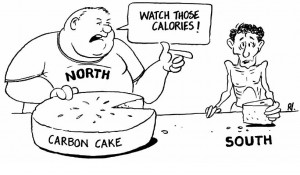 Taking Professor Barnum’s class American Inequalities while in the mosaic has enabled me to really trace the pattern of poverty in those affected most by policy backfires. The housing crisis of 2008 leading to the Great Recession hit those who lost their mortgages and went through foreclosures the most even though the housing bubble burst because of irresponsible lending by large banks. As Joseph Stiglitz, the economist who coined the term the “1% and 99%” writes “the irony is that in the crises that finance brings about, workers and small businesses bear the brunt of the costs” (Stiglitz 66). The 1% can play around with the system in order to eke out as much profit as possible despite the harm its actions might cause the rest of society. The sad part is, the trickle-down effect is bogus. Increased profits for the 1% does not fuel the overall American economy because the richer one is, the smaller portion of their income they actually spend. Thus, those most defenseless against economic hardships are the ones most vulnerable to exploitation by the 1%.
Taking Professor Barnum’s class American Inequalities while in the mosaic has enabled me to really trace the pattern of poverty in those affected most by policy backfires. The housing crisis of 2008 leading to the Great Recession hit those who lost their mortgages and went through foreclosures the most even though the housing bubble burst because of irresponsible lending by large banks. As Joseph Stiglitz, the economist who coined the term the “1% and 99%” writes “the irony is that in the crises that finance brings about, workers and small businesses bear the brunt of the costs” (Stiglitz 66). The 1% can play around with the system in order to eke out as much profit as possible despite the harm its actions might cause the rest of society. The sad part is, the trickle-down effect is bogus. Increased profits for the 1% does not fuel the overall American economy because the richer one is, the smaller portion of their income they actually spend. Thus, those most defenseless against economic hardships are the ones most vulnerable to exploitation by the 1%.

This reminds me of my research on LDCs and their vulnerability to climate change despite the fact that they did little to cause the problem. LDCs have contributed next to nothing in GHG emissions causing global climate change. Still, they will be the ones worst hit. Developed countries have been emitting GHGs for over a century, causing global climate change and as a result, have become rich and powerful in the global governance arena. Meanwhile, LDCs have stayed behind and will also be the first, and worst, hit by droughts, sea level rise, and temperature changes due to climate change. The fact that LDCs often still rely on subsistence agrarian societies- a sector way too reliant on climate considering the upcoming roller coaster. While developed countries have been able to develop away from agrarian societies and on the way caused climate change, LDCs have been left behind with agrarian societies put at great risks in the face of climate change.
LDCs, like the most impoverished in the US, are the ones hit hardest by the development schemes of the rich, yet they feel none of the benefits. This reflects a greater trend in all of society, where those who are poor are the most disadvantaged. There is no way for the poor to “pick themselves up by their bootstraps” while the rich are constantly tying them down through their own schemes of exploitation. Only when this trend is changed will policies have a possibility of creating more equal successes for all.
